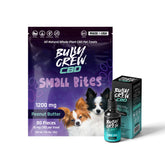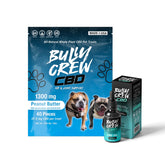Hearing the words "your dog has cancer" is a punch to the gut. In that moment, your world shifts—and all that matters is helping your pup feel safe, loved, and as comfortable as possible. Dog Chemotherapy can be a powerful treatment, but let's be honest: the side effects can be tough on our four-legged friends.
That's where CBD enters the conversation. From easing discomfort to calming nerves, it has become a hot topic among pet owners seeking additional ways to support their dogs during treatment. But is it actually helpful? Is it safe? And how do you even get started?
In this blog, we'll walk you through the essentials so you can explore whether CBD might be the right fit for your dog's cancer journey.
Understanding Chemotherapy for Dogs
First, let's briefly understand what chemotherapy for dogs entails. Chemotherapy is a common and often effective treatment for many types of canine cancer. It involves using powerful drugs designed to kill rapidly dividing cancer cells. The goal is to shrink tumors, prevent cancer spread, and improve or extend a dog's life.
However, because chemotherapy drugs target fast-growing cells, they can also affect healthy, rapidly dividing cells in the body, such as those in the digestive tract, bone marrow, and hair follicles. This can lead to a range of side effects, which vary depending on the specific drugs used, the dosage, the dog's sensitivity, and the type of cancer. Common dogs on chemotherapy side effects include:
-
Gastrointestinal Issues: Nausea, vomiting, diarrhea, loss of appetite. These are among the most frequently observed and distressing side effects for dogs.
-
Low Blood Cell Counts (Myelosuppression): Chemotherapy can suppress bone marrow activity, leading to a decrease in white blood cells (increased risk of infection), red blood cells (anemia), and platelets (bleeding issues).
-
Lethargy and Fatigue: Dogs often feel tired and less energetic during and after treatments.
-
Hair Loss (less common than in humans, but can occur): Some breeds may experience thinning fur or loss of whiskers.
-
Weight Loss: Due to nausea, decreased appetite, or metabolic changes from cancer itself.
-
Pain: From the cancer itself or sometimes from the side effects of treatment (e.g., mouth sores).
Managing these side effects is crucial for maintaining a dog's quality of life throughout their chemotherapy journey. This is where supportive therapies, including complementary options like CBD, come into play.
What Exactly is CBD?
CBD, or Cannabidiol, is one of over a hundred naturally occurring compounds found in the cannabis plant. Unlike Tetrahydrocannabinol (THC), which is the psychoactive component of marijuana, CBD is non-intoxicating. This means it won't make your dog "high."
Most CBD products for pets are derived from hemp, a variety of cannabis plants that contain very low levels of THC (typically less than 0.3%). This low THC content ensures the safety of animals.
How does CBD work?
CBD interacts with a complex system in the body called the endocannabinoid system (ECS). The ECS is present in all mammals, including dogs, and plays a vital role in regulating various bodily functions, including:
-
Pain sensation
-
Mood and emotion
-
Appetite and digestion
-
Sleep
-
Immune response
-
Inflammation
When CBD enters the body, it interacts with the endocannabinoid system (ECS), helping to restore balance (homeostasis) within these systems. This broad interaction is why CBD is being investigated for such a wide array of potential therapeutic applications.
How Might CBD Help During Dog Chemotherapy?
The potential benefits of CBD for dogs undergoing chemotherapy primarily revolve around its ability to reduce the uncomfortable side effects of treatment and potentially improve overall well-being. It's crucial to understand that CBD is considered a supportive therapy, not a cure or a standalone cancer treatment.

Here's how CBD might offer help for chemo and dogs:
-
Managing Nausea and Vomiting: One of CBD's most promising applications in supportive care is its potential to calm an upset stomach. Chemotherapy often causes significant nausea and vomiting, leading to discomfort and reluctance to eat. Research suggests that CBD interacts with serotonin receptors in the brain, which play a role in regulating nausea. By modulating these pathways, CBD may help reduce the frequency and severity of vomiting, allowing dogs to feel more comfortable and potentially retain more nutrients.
-
Alleviating Pain and Discomfort: Cancer itself can be painful, and dog chemotherapy can sometimes contribute to general aches or discomfort. CBD is well-known for its analgesic (pain-relieving) and anti-inflammatory properties. It interacts with pain receptors and pathways in the ECS, which can help to reduce pain perception and alleviate inflammation that contributes to discomfort. This can be particularly beneficial for dogs suffering from tumor-related pain or generalized malaise.
-
Stimulating Appetite: Loss of appetite is a common and concerning side effect of chemotherapy. Dogs may feel nauseous or simply lack the desire to eat, leading to weight loss and weakness. While THC is more directly associated with appetite stimulation (the "munchies"), some anecdotal evidence and early research suggest that CBD, by reducing nausea and discomfort, can indirectly encourage a dog to eat more. A calmer stomach and less pain can make food more appealing.
-
Reducing Anxiety and Stress: The experience of illness, frequent vet visits, and feeling unwell can cause significant anxiety and stress in dogs. CBD has shown promise in helping to reduce anxiety by influencing serotonin levels in the brain. A calmer, less anxious dog is often more comfortable, more willing to eat, and better able to cope with their treatment regimen. This can lead to a generally improved mood and better quality of life.
-
Anti-inflammatory Effects: Inflammation is a core component of many diseases, including cancer, and can be exacerbated by chemotherapy for dogs. CBD possesses powerful anti-inflammatory properties by interacting with receptors in the immune system and reducing the production of inflammatory molecules. By reducing systemic inflammation, CBD may contribute to overall well-being and potentially mitigate some treatment-related side effects.
-
Potential Anti-Tumor Effects (with Significant Caveats): This is the most controversial and least established area of research regarding CBD and cancer. Some preliminary studies (mostly conducted in cell cultures or animal models rather than in clinical trials involving dogs during chemotherapy) suggest that cannabinoids may have anti-cancer properties, including inhibiting cancer cell growth, promoting cancer cell death (apoptosis), or reducing metastasis. However, it is critical to emphasize that CBD is NOT a cure for cancer and should NEVER be used as a replacement for conventional chemotherapy for dogs or other veterinary cancer treatments. Any discussion of CBD's direct anti-cancer effects must come with strong disclaimers that this research is nascent, experimental, and certainly not yet applicable to clinical practice for dogs. It should only be considered under strict veterinary supervision as part of a multi-modal approach.
Important Considerations Before Using CBD with dog Chemotherapy
While the potential benefits sound encouraging, it is absolutely paramount to approach CBD use during chemotherapy with caution and thorough preparation. The most important piece of advice is: ALWAYS consult your veterinarian, especially your veterinary oncologist, before starting CBD.
Here's why, and what else you need to know:
-
Veterinary Consultation is Non-Negotiable: Your vet knows your dog's specific cancer, chemotherapy protocol, and overall health status. They can advise whether CBD is appropriate, help determine a safe starting dose, and monitor for any interactions or adverse effects. They can also explain current research and legal aspects relevant to your location.
-
Potential Drug Interactions: This is a major concern. CBD can interact with certain medications by affecting how the liver metabolizes drugs. Specifically, CBD inhibits cytochrome P450 enzymes, which are responsible for breaking down many common drugs, including some chemotherapy agents and other supportive medications (like anti-nausea drugs or pain relievers). This means CBD could potentially increase or decrease the levels of other drugs in your dog's system, leading to unexpected side effects or reduced efficacy. Your vet needs to be aware of all medications your dog is on.
-
Quality and Purity of CBD Products: The CBD market is largely unregulated, leading to significant variations in product quality.
-
Third-Party Lab Testing: Only choose products that provide a Certificate of Analysis (COA) from an independent, third-party lab. This COA should confirm the CBD content, verify that THC levels are below 0.3% (or undetectable), and show that the product is free from harmful contaminants like pesticides, heavy metals, and residual solvents.
-
Full-Spectrum vs. Isolate: Full-spectrum CBD contains all the beneficial compounds found in hemp, including other cannabinoids, terpenes, and flavonoids, which are thought to create an "entourage effect" (meaning they work better together). Isolate is pure CBD. Full-spectrum is generally preferred, but ensure THC content is verified safe.
-
Organic Sourcing: Opt for products made from organically grown hemp to avoid pesticide exposure.
-
Dosing is Not Standardized: There is no universal "right" dose for CBD, especially for dogs undergoing chemotherapy. Dosing depends on your dog's weight, the severity of their symptoms, their individual metabolism, and the concentration of the CBD product. It's usually recommended to start low and go slow, gradually increasing the dose while carefully monitoring your dog's response. Your vet can provide guidance on a safe starting point.
-
Legality: The legality of CBD for pets varies by region. While hemp-derived CBD (under 0.3% THC) is federally legal in the USA, state or local laws can differ. Always check the regulations in your area.
-
CBD as Part of a Holistic Approach: CBD should not be viewed as a standalone miracle cure. Instead, it should be considered as one component of a comprehensive supportive care plan designed by your veterinary team. This plan might include prescription anti-nausea medications, appetite stimulants, pain relievers, nutritional support, and emotional comfort.
Administering CBD to Your Dog
CBD products for dogs typically come in a few forms:
-
Oils/Tinctures: These are often the most recommended because they allow for precise dosing (using a dropper) and can be easily mixed into food or given directly into your dog's mouth. This method also allows for good absorption.
-
Treats: CBD-infused treats are convenient, but precise dosing can be harder, and the amount of CBD per treat can vary. Absorption might also be less efficient than with oils.
-
Topical Creams: Less common for chemotherapy side effects but might be considered for localized pain.
When administering, consistency is key. Give CBD at regular intervals as advised by your vet.
Conclusion
Caring for a dog with cancer is incredibly tough, and watching them go through chemotherapy can be heartbreaking. Naturally, you want to do everything possible to make your pup feel better and more comfortable. That's where CBD may be able to help—some pet owners find it helpful in easing chemo side effects like nausea, pain, anxiety, and loss of appetite.
Before adding CBD to your dog's chemotherapy regimen, it's essential to consult with your veterinarian or veterinary oncologist. They can help you determine if it's safe, what the correct dose is, and how to monitor for any side effects. If you choose to try it, look for high-quality CBD products that third-party laboratories have tested for safety and accuracy.
With the proper support and care, CBD offers your dog extra comfort during a difficult time.







